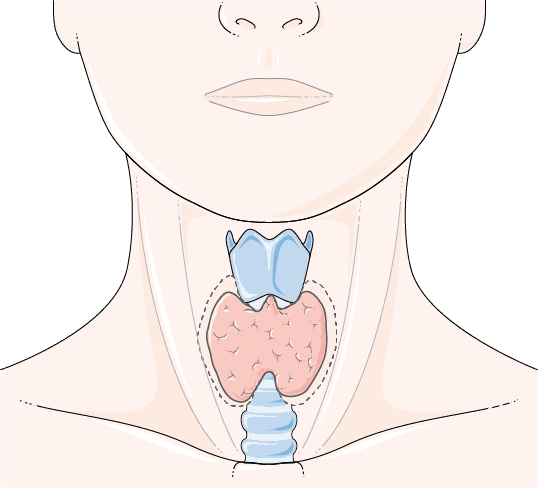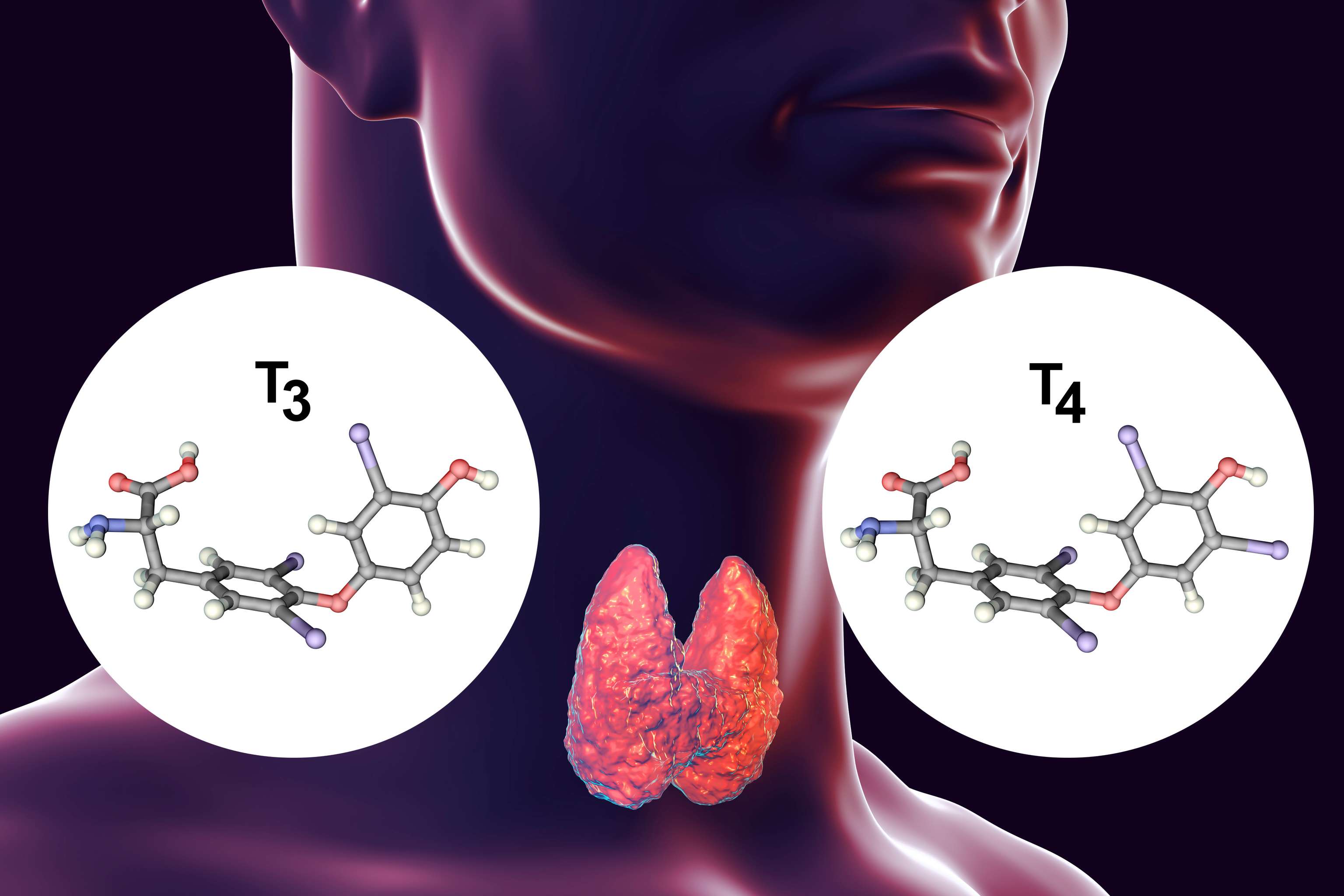Basics
In the case of hypothyroidism, there is a deficiency of the thyroid hormones triiodothyronine and thyroxine in the body.
In the case of hypothyroidism, there is a deficiency of the thyroid hormones triiodothyronine and thyroxine in the body.

There are various reasons for reduced or completely restricted hormone production by the thyroid gland and a subsequent lack of thyroid hormones, which the body needs to maintain its metabolic processes. A common symptom is a visibly enlarged thyroid gland (called a goitre). The consequences of an underactive thyroid are metabolic restrictions and symptoms such as tiredness and fatigue. Hypothyroidism in infants and children can lead to growth and development disorders.
In most cases, there is acquired primary hypothyroidism, where thyroid function is normal at the time of birth and the symptoms only develop during the course of life. Primary means that hormone production is disturbed directly in the thyroid gland. Possible causes for this are
The most common cause of hypothyroidism is Hashimoto 's thyroiditis. As part of this autoimmune disease, autoantibodies are formed against components of the thyroid cells for reasons that are still unknown. The chronic inflammation triggered leads to damage to the thyroid gland with a decrease in hormone production.
In some cases, hypothyroidism is caused by medical intervention. This may be intentional or unintentional. Examples of this are operations in which the thyroid gland has been completely or partially removed. Hypothyroidism can also be caused by taking thyroid-inhibiting medication (thyreostatics) or as a side effect of other medication (e.g. amiodarone).
A pronounced deficiency of iodine or selenium can lead to hypothyroidism.
In rare cases, hypothyroidism is the result of a problem in the upstream hormonal regulatory circuits in the pituitary gland (hypophysis) or in the brain (hypothalamus). This is referred to as secondary or tertiary hypothyroidism.
A congenital form is also rare, in which, for example, a missing or only partially developed thyroid gland or receptor defects are responsible for hypothyroidism.
A lack of thyroid hormones affects most organs in the human body. Patients with hypothyroidism usually feel weak and tired. The thyroid gland tries to compensate for the reduced hormone production with increased growth, which is why people with hypothyroidism are often diagnosed with an enlarged thyroid gland (goiter).
The following symptoms are indicative of hypothyroidism:
Particularly in older patients, the symptoms are often unspecific and the diagnosis of hypothyroidism is difficult.
Newborns with hypothyroidism are often conspicuous by reduced drinking behavior, digestive disorders and reduced motor activity. Hypothyroidism has a negative effect on the development and growth of children, which is why children with hypothyroidism can show delayed mental and physical development.
In order to diagnose a thyroid disease or dysfunction, the thyroid function (hyperthyroidism, hypothyroidism or normal function) is determined via a blood test and the thyroid structure (morphology) is examined using ultrasound after a detailed discussion including a medical history (anamnesis). These two parameters do not necessarily correlate and must always be considered in combination in order to ultimately arrive at a diagnosis and subsequently adequate treatment.
The healthy function of the thyroid gland is based on the following mechanism: the thyroid gland secretes the free thyroid hormones thyroxine (fT4) and a small amount of triiodothyronine (fT3), which are essential for the metabolism, whereby fT3 is also converted from fT4 outside the thyroid gland in various organs and made available to the body.

The level of fT4 and fT3 in the blood is in turn regulated by the pituitary gland in the brain, which produces TSH. TSH is considered the most sensitive parameter with regard to a possible thyroid dysfunction: a rising TSH value is the first sign of an underactive thyroid; a falling TSH value, on the other hand, is the first sign of an overactive thyroid. The pituitary gland performs a similar function to the thermostat of a heating system: it recognizes even the slightest deviations in the thyroid hormones fT4 and fT3 and adjusts the release of TSH accordingly. If the thyroid hormone level in the blood is too low, the pituitary gland releases larger amounts of TSH; if the thyroid hormone level in the blood is too high, the pituitary gland causes TSH to drop. Consistently high TSH values therefore provide the doctor with indications of hypothyroidism.
The thyroid function is examined by taking a blood sample. Antibodies directed against the thyroid gland can also be examined.
Babies are routinely screened for hypothyroidism after birth during newborn screening. For this examination, a few drops of blood are taken from the newborn's foot on the third day after birth and analyzed.
The structure of the thyroid tissue also provides information about the function and condition of the thyroid gland. The size, consistency and presence or degree of inflammatory infiltration of the thyroid tissue can be determined by means of an ultrasound examination.
Another examination and diagnostic method is thyroid scintigraphy. In this nuclear medicine examination, the patient is administered a slightly radioactive drug either intravenously or orally. The patient then has to wait around 20 minutes so that the medication - like naturally occurring iodine - can accumulate in the thyroid gland. This allows the regional metabolism of the thyroid gland to be recorded using a gamma camera. The slightly radioactive medication is harmless; the patient excretes it in the urine within a day. Thyroid scintigraphy is used to investigate the cause of hypothyroidism and differentiate it from other diseases.
In the rare cases where there is a specific cause of hypothyroidism, this should be treated, for example by discontinuing causative medication (thyrostatic drugs, amiodarone) or compensating for an iodine deficiency.
Hypothyroidism can normally be treated very well with hormone replacement therapy. The aim of treatment is to compensate for the hypothyroidism using thyroid hormone in the form of tablets so that the resulting symptoms subside. The thyroid hormone, which the thyroid gland can no longer produce on its own, is therefore permanently replaced by a hormone tablet (hormone replacement). Patients with hypothyroidism usually have to take thyroid hormone tablets every day for the rest of their lives. Regular checks and, if necessary, adjustments to the dose of medication - especially in special phases of life such as the desire to have children, pregnancy and breastfeeding - are extremely important.
Treatment is started with a low dosage and slowly increased until the desired effective dose is achieved.
Timely treatment with thyroid hormones is also important for newborns and children with congenital hypothyroidism in order to prevent possible developmental disorders and enable healthy development.
In most cases, hypothyroidism has a good prognosis as it can be adequately treated with hormone preparations. Existing symptoms such as tiredness and reduced performance usually disappear with substitution.
Newborns with hypothyroidism have a good chance of normal development if the disease is recognized and treated early. However, if hypothyroidism is detected too late, growth and developmental disorders can no longer be reversed.
In most cases, hypothyroidism is caused by Hashimoto's thyroiditis, against whose autoimmune reaction there are no preventive measures.
Hypothyroidism caused by iodine deficiency can be prevented by sufficient iodine intake. In German-speaking countries, iodine is added to conventional table salt to ensure an adequate supply.
If there are indications of hypothyroidism, a doctor should be consulted and checked.

Olivia Malvani, BSc

Dr. med. univ. Bernhard Peuker, MSc
Browse our extensive database of medications from A-Z, including effects, side effects, and dosage.
All active ingredients with their effects, applications, and side effects, as well as the medications they are contained in.
Symptoms, causes, and treatments for common diseases and injuries.
The presented content does not replace the original package insert of the medication, especially regarding the dosage and effects of individual products. We cannot assume liability for the accuracy of the data, as the data has been partially converted automatically. Always consult a doctor for diagnoses and other health-related questions.
© medikamio